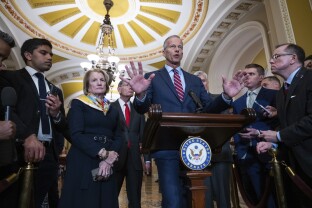Congress is back in session — and Republicans are hoping for some movement on their marquee reconciliation bill.
“I would think within a week or two,” Sen. Rand Paul forecasted last week on the Senate’s timeline for picking up and amending the House-passed budget resolution, which would unlock the reconciliation process. “It won’t be completed. The process is going to be ongoing.”
Reconciliation had largely fallen on the backburner before both the Senate and House left for a one-week recess, which was the Senate’s first all year. Government funding and the March 14 shutdown deadline consumed Congress’ final week together, with Senate Democrats squabbling over whether to support the bill.
Republicans left things somewhat divided. House Republican leadership had declined to take up the first of the Senate GOP’s reconciliation bills — Senate Republicans plan to pass two separate bills overall. Meanwhile, Senate GOP leadership signaled it’s willing to pick up — and change — the House’s “one big, beautiful bill,” as President Donald Trump has dubbed it.
There are no exact timelines yet, and any changes to the bill would kick it right back to the House for another round of votes.
In the final days before recess, there was a smidgen of momentum. Senate GOP leadership and Senate Finance Committee Republicans met with Trump to discuss tax provisions in the bill.
“It was very helpful to a lot of our members just to hear directly from the president how he sees this,” Senate Majority Leader John Thune told reporters shortly after the meeting.
“It’s all part of a process of working with the White House and the House to get to the end result,” he added.
That end result is Republicans’ best shot at passing sweeping policy changes this term, while they have control of the House, Senate and White House. Reconciliation allows the Senate in particular to bypass the filibuster’s 60-vote threshold, so long as the legislation is tied to the federal budget.
That means Republicans should require no Democratic support for passage, so long as they all manage to get on the same page.
But there are some disagreements to work out. Paul put it this way: “Probably what we will do is talk each other to death, stare at each other and then eventually confuse the issue so much that it takes two months to unravel.”
“I don’t think this will be like one of the spending-bills-with-a-deadline, where all of a sudden, boom, it goes somewhere, and then you’re stuck with what you get,” he added. “I think they are going to have to pre-negotiate the terms.”
There are a handful of tedious but vital tangles left to undo. Provisions that could cut Medicaid funding in the House’s budget resolution have been a cause for concern for multiple Republicans in the Senate — particularly those from states with high enrollment rates.
“From the standpoint of Medicaid, West Virginia has a gigantic participation,” Sen. Jim Justice told reporters over the break. “Really and truly, we have concerns, and we’re going to have to watch as this thing filters all the way through.
“At the same time, we know there’s waste like we can’t imagine,” he added. “We know that.”
But the Senate might be even more torn over tax policy. While the House’s rendition extends Trump’s first-term tax cuts (which are due to expire later this year) by eight years, the Senate wants to make them permanent.
“Once we get these top lines, the top issues with policy, law, permanency versus eight years, then the rest of the stuff will kind of move forward,” Sen. Markwayne Mullin, a close ally of House and Senate GOP leadership, said before leaving town.
Though, referring to the tax provisions, Mullin noted “there’s a big difference between them having eight years and us having permanency on ours.”
Thune has said he doesn’t want Congress on a “merry-go-round” of having to address the tax provisions every few years. Speaker Mike Johnson has said he’s also open to making tax cuts permanent, but his margins in the House are far more delicate than those in the Senate.
There is also lingering hope among some Republicans to include an increase to the debt limit in the reconciliation legislation. Though that may prove tricky, seeing as a number of conservative stalwarts have voted against debt-limit increases every time they’ve come around.
Thune said leaders discussed including the debt limit in the package at the White House meeting this month, but no decision was made.
“It’s important that we socialize a lot of these ideas, things that were in the House bill… The budget resolution is the first step,” he said. “It’s sort of a blueprint, but it unlocks reconciliation, and that’s where we make law, and that’s the hard part.
“So we’re trying to get the hard part done and figure out what it is we can do,” he added.
—
Ursula Perano is a reporter at NOTUS. Ben T.N. Mause and Reese Gorman contributed reporting.
Sign in
Log into your free account with your email. Don’t have one?
Check your email for a one-time code.
We sent a 4-digit code to . Enter the pin to confirm your account.
New code will be available in 1:00
Let’s try this again.
We encountered an error with the passcode sent to . Please reenter your email.


